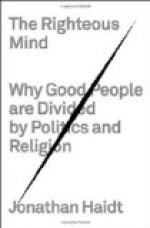|
This section contains 972 words (approx. 3 pages at 400 words per page) |

|
Chapter Two: The Intuitive Dog and Its Rational Tail Summary and Analysis
The mind is divided into parts that often conflict. One's intellect can form a conclusion about a matter that is not matched by one's emotional reaction. Western philosophy has given more credence to reason than to passion. When something is made sacred by "rational" delusion it can eradicate the ability for a culture to assess it clearly. Plato said that reason should be master. Hume said that reason should be subservient to passion. Thomas Jefferson found a way to agree with both and saw reason and passion as separate but equal entities. While in Paris, Jefferson had fallen in love with a married woman. Addressing the conflict between propriety and emotions, he wrote a letter to his beloved in which he portrayed his heart and...
(read more from the Chapter Two: The Intuitive Dog and Its Rational Tail Summary)
|
This section contains 972 words (approx. 3 pages at 400 words per page) |

|




